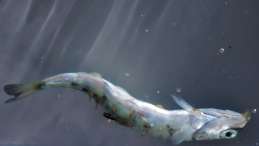Lousy Choices: Parasitic Lice out of Control on Salmon Farms
Lice on salmon farms have become resistant to the only drug approved to treat them.
A report issued today by Living Oceans and Raincoast Research reveals that sea lice were out of control on Clayquot Sound salmon farms in 2018 because they have evolved resistance to SLICE, the single drug approved for use in Canada. The report provides evidence that Fisheries and Oceans Canada (DFO) knew as early as 2014 that resistance was developing in sea lice, but did not take measures to ensure the protection of wild juvenile salmon from the parasite.
“Eighteen years after this issue was brought to DFO’s attention there is still no protection for wild salmon,” said Alexandra Morton of Raincoast Research. “Independent researchers in Clayoquot Sound documented 96% of the wild juvenile salmon were infected with an average of over 8 lice per fish. One of the fish they recovered had 50 lice. I don’t hold hope that much of this generation of wild salmon survived.”
Living Oceans and Raincoast were each independently made aware of the soaring lice levels in Clayoquot this spring. Morton visited the region to photograph the juveniles, while Living Oceans contested Cermaq Canada’s continued use of the Aquaculture Stewardship Certification logo on their product. The company eventually withdrew voluntarily from using the logo and was subsequently suspended by the ASC.
More troubling than the evolution of drug resistance is the response of DFO to the crisis. “DFO first began to see SLICE-resistance building in lice in the Broughton Archipelago in 2014. They first denied that the evidence existed; then they withheld evidence from the Minister of Agriculture’s Advisory Committee on Finfish Aquaculture in 2017-2018. Throughout that time, DFO did not take measures to ensure that salmon farmers would have alternate treatments for sea lice ready for deployment when SLICE resistance resulted in failure to control lice in 2018.”
The groups are calling on the Minister of Fisheries and Oceans, Jonathan Wilkinson, to transition the industry out of open ocean netpens and into land-based, closed containment. “We are now faced with a situation where the only way to control sea lice on netpen salmon farms includes dumping toxic chemicals directly into the ocean,” said Wristen. “No other form of agriculture is allowed to deliberately introduce toxins into public waters. We’re asking the Minister to stop treating the ocean like a sewer.”
-30-
Contact Information
Karen Wristen, Executive Director, Living Oceans Society: 604-788-5634
Alex Morton, Raincoast Research: 250-974-7086
Background
Download the report, Lousy Choices: Drug-resistant sea lice in Clayoquot Sound, here.

